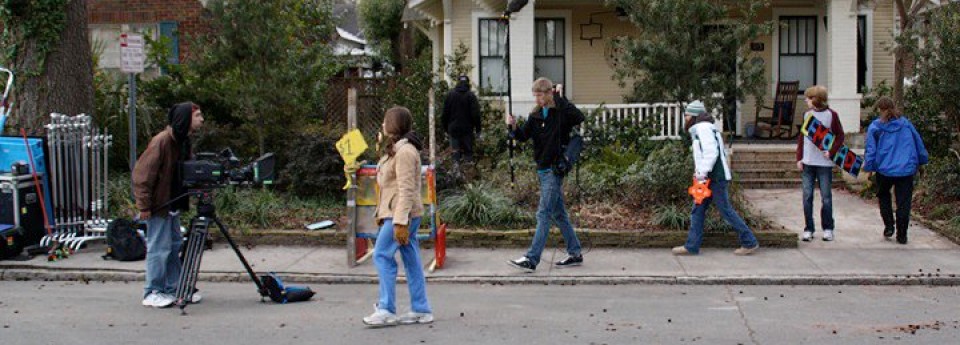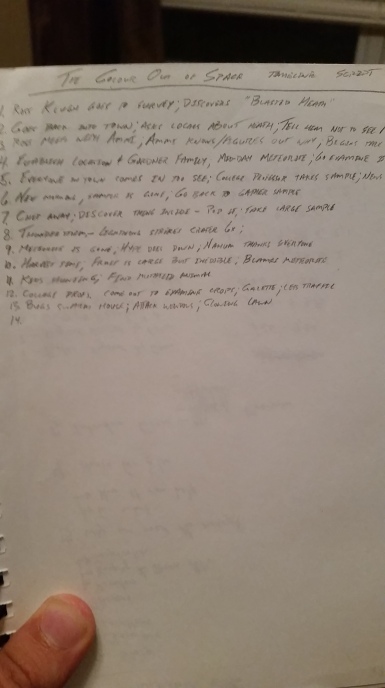Tags
advice, Bill Murray, Butter, character, Comedy, concept, Deadpool, design, development, dialogue, filmmaker, Ghostbusters, goals, Groundhog Day, History of the World, ideas, inspire, Mel Brooks, Men in Tights, movie, movie maker, necessity, Originality, Parody, process, Pt. I, Robin Hood, screenwriting, script, situation, teach, The Thin Man, When Harry Met Sally, writer

Hello readers! Just wanted to write and let you know that I’m not dead. And no, I haven’t given up on posting. My job has been very interesting the last few weeks and it’s hard to keep up with that and with this whole posting thing. The good news, though, is that it has given me time to come up with new ideas.
Now if you need a refresher, last time we were talking about studying film. Well, I think this goes hand in hand with that. It’s a bit of a change in pace, but I think it will come in handy. And, as a bonus, since I’ve fallen behind on my posting, the next few days will have a new post about a new genre. Hopefully I can get through most of them. Okay, ready to get back into things? Good.
I’m starting with comedy for two reasons. First, I think (and a majority of people might agree) comedy is the hardest thing to pull off well and I think it’s always best to start with something difficult and go downhill from there. And with comedy, it’s the one thing that walks a fine line of skill. The other reason is because with the new GHOSTBUSTERS coming out today, it will perfectly illustrate some points. Now, if you know me or you’ve stuck with me, you know that I don’t fall into the closed-minded group of people who don’t have a good reason to see the movie. I choose not to see it for a variety of reasons. Some I’ll illustrate here. But my opinion is just that – an opinion. If you’re excited, go see it. I’m one person. And as long as you don’t call me sexist or misogynist, then we’ll remain friends. Okay, moving on.
So what makes comedy so hard? Compared to other genres, comedy is very polarizing. Action can appeal to everyone (if done well, of course) and drama can appeal to a large group (again, if done well). But comedy seems to be the most divisive. This is because people are very different about what they find funny. Personally, I’m old school with my comedy – both in writing and in enjoyment. What do I mean? I enjoy comedy that doesn’t insult my intelligence, for one. Obvious humor is one thing that seriously irritates me. An example I used once before was when a “comedy” movie has a character hit in the face with a shovel (I think IDENTITY THIEF was the example) and suddenly the character hit shouts out “Ow! You just hit me with a shovel!” Now, I don’t know about you, but I’m pretty sure I just saw that. Why do I need it said again? It’s almost a dead-horse mentality. And as an audience member and a writer, it feels lazy and insulting that they assume I didn’t see it the first time.
Subtlety goes a long way with comedy. It gives the audience something to think about, like “why is this funny? Oh, hahaha!” Now I know what you might be thinking: Why do I need to think about why something is funny? I don’t mean you have to go into the philosophy aspect. I mean simply this: You have to decide if something is funny. How many of us have laughed at those Dad jokes in life because, let’s face it, they were actually funny? It’s because we think about why it is funny and we appreciate the effort into it. Consider these examples from Ghostbusters, both the reboot/remake and the original:

This line was emphasized in a trailer or somewhere. Personally, I don’t think it’s all that funny. Why? It doesn’t give me a chance to appreciate the humor. Instead, it practically screams “This is supposed to be funny! Laugh!” Now, consider a similar scene from the original (the actual part I’m talking about starts at 1:04).
With one line, we laugh. Why? Because it’s so simple. It’s subtle. It’s not in your face. It’s not forced. It’s the character’s actual reaction as they would say it. But not only that, but the reaction from Dan Aykroyd is priceless. His friend just had an encounter with a ghost and he’s almost like “Man, I wish it was me!”
Now, of course there is an exception to this rule of subtlety. As writers, we have to know our characters. And if our character is over the top, then the comedy they provide should be. But it should also be subtle. How is that possible? Like this:
Is this over the top? Just a bit. It’s part of her character (by which I mean she’s proving a point). So how is this subtle? Mostly in part due to the final line of the scene (delivered by director Rob Reiner’s mother). You don’t know how people are going to react, and when it’s over, it’s not what you expect. It’s a surprise. A line from SHERLOCK HOLMES: A GAME OF SHADOWS comes to mind and perfectly sums it up: “It’s so overt, it’s covert.” It comes out of nowhere, but you kinda expect it at the same time. But you don’t know how it goes over. The one character I think who best portrays this is Deadpool, from his movie. We know the character and we know he always has to say or do something, but in the context is what matters and we laugh because we don’t expect it.
Context is another big thing for comedy. Depending on how and where a line is delivered or a situation gets out of hand (in a funny way) has an impact on the audience. Let’s turn to the master of parody, Mel Brooks. In my favorite movie of his, HISTORY OF THE WORLD, PT. I, there’s a scene where characters are trying to escape Roman soldiers. Suddenly, Moses raises his hands and splits the water they are trapped at. It’s only after they escape that we realize that Moses wasn’t trying to save them. He’s being held up and robbed. What context is this? It’s a biblical miracle explained away as simple larceny. Not quite the same? Let’s look at ROBIN HOOD: MEN IN TIGHTS. The archery contest. When Robin Hood supposedly loses but retaliates with pulling out the script and getting another shot. Context? The hero technically lost. But by going meta, he can pull out a win because that’s the way it’s “supposed” to go. Here’s an older compilation from the THIN MAN series of films from the 30’s (I told you I was old school).
Nick and Nora are a married couple who solve mysteries together while throwing back liquor as often as possible. Context? You can figure it out by now.
Finally, when writing comedy it’s not always about jokes. Sometimes a situation is all you need. My next example is from the movie BUTTER.
Now, the situation: Hugh Jackman (completely playing against type brilliantly) just had sex with his old flame (a married woman). And what does he do? He prays to god and thanks him. Now, the humor in this scene, to me, comes from the way he prays, not the fact that he prays. It’s set up by the situation. And it’s funny because who prays to god that way? GROUNDHOG DAY, another Bill Murray movie, proves this point. The fact that he has to relive the same day over and over is funny enough. But the way he goes through it and tries different ways to deal with annoying locals is hilarious.
Now, I hate to keep picking on the new Ghostbusters, but honestly, I’ve been overloaded with so much from that movie that it’s fresh in my mind. And because I try to avoid movies I’m not interested in. But as an example, there’s a scene where the characters are at a concert. And to get to the ghost, the character Patty tries to crowd surf. Instead, she lands on her back and cries out, “I don’t know if it was a race thing or a lady thing, but I’m mad as hell!” While to some this could be funny, I don’t think it is. Why? Because it’s tired. I’ve seen it a hundred times or more. Comedy, from a situational standpoint, should be fresh. It doesn’t necessarily have to be original (Groundhog Day uses an old idea but adds the twist of being set during a holiday in a town that takes it VERY seriously), but this situation takes a tired idea and tries to spice it up with a very obvious jab at weight (not race or gender, as it’s trying to direct our attention to).
I think I’ve held your attention long enough. Here’s what I’m going for: When you write comedy, don’t try to make it obvious. It comes off almost in same vein as the “Movie” movies (Date Movie, Epic Movie, Meet the Spartans, etc.). Comedy should be subtle to give people a chance to think about why it’s funny and decide if it is in fact funny. If you want natural comedy, think about how you would react in a situation. If you ask yourself “Is this funny because it is? Or is it funny because I say it is?” then you might have luck figuring it out. Stay away from the obvious. Part of what makes humor funny in a movie is when the audience sees something they might expect and are pleasantly surprised.
So, while I have no intention of seeing Ghostbusters because of my creative difference, I suggest if you want to go see it, do so. And if you don’t like it, then you have an opinion. I have no agenda. Everyone has their own tastes. Anyway, next time we’ll talk about drama. I think that’s the next hardest genre. So until then, write funny!










